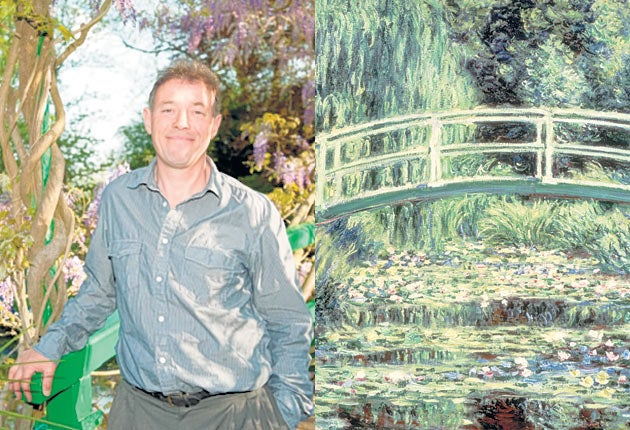The British gardener who's taking care of Monet's water lilies

Your support helps us to tell the story
From reproductive rights to climate change to Big Tech, The Independent is on the ground when the story is developing. Whether it's investigating the financials of Elon Musk's pro-Trump PAC or producing our latest documentary, 'The A Word', which shines a light on the American women fighting for reproductive rights, we know how important it is to parse out the facts from the messaging.
At such a critical moment in US history, we need reporters on the ground. Your donation allows us to keep sending journalists to speak to both sides of the story.
The Independent is trusted by Americans across the entire political spectrum. And unlike many other quality news outlets, we choose not to lock Americans out of our reporting and analysis with paywalls. We believe quality journalism should be available to everyone, paid for by those who can afford it.
Your support makes all the difference.A British gardener is to take over one of the most venerated plots of ground in the world: the garden created more than a century ago by the French Impressionist painter Claude Monet.
From next month, James Priest, 53, will become head gardener at Giverny in Normandy, Monet's home for 43 years and the inspiration for some of his most admired paintings, including his famed water lily canvases.
Mr Priest, who was trained at the Royal Botanic Gardens in Kew, becomes a successor to Monet himself, who designed and shaped the five acres of flower beds and water lily ponds until his death, aged 86, in 1926
"This is an enormous honour and I'm only just beginning to realise how daunting a task it will be," Mr Priest told The Independent yesterday. "The garden seems very simple but the more you look at it you see that it is a very rich garden, a very profound garden. On top of that, there is the enormous public and media interest in what goes on here. I have just been interviewed for the French television news. That never happened in my previous jobs."
Mr Priest, who comes from Maghull, north of Liverpool, has worked in France for 26 years, looking after the grounds of a succession of large estates, including 17 years working for Baron Elie de Rothschild at Royaumont near Chantilly. At Giverny, he succeeds Gilbert Vahé who restored the garden in the late 1970s from an overgrown wilderness to the glory of its Monet days. Mr Vahé, who is retiring after 35 years, will retain a consultancy role.
One of the best known features of the garden, the hump-backed Japanese bridge over a lily pond, features in the Woody Allen movie Midnight in Paris which will open the Cannes film festival next week.
Mr Priest, who will head a team of eight gardeners , said his intention was to preserve the "unique identity and character" of Giverny. "This is not an English garden, although it has some English features. It is not exactly a French garden either," he said. "It is an artist's garden, which parallels in some respects the way that Monet painted. He built up his canvasses in layers of paint, to catch the light in different ways. In the same way, you realise that the flower beds here have been conceived in layers of height and colour to catch the light."
Monet's house and garden at Giverny, run by the Fondation Claude Monet, attract 500,000 visitors a year from all over the world. The artist moved to Giverny, 60 miles west of Paris, in 1883. He started the garden initially as a source of cut flowers which he could paint indoors on dull or rainy days. "He seems rapidly to have succumbed to the obsession, the disease, which is love of gardening," Mr Priest said. Some of Monet's most loved late paintings show Giverny, including large canvasses of water lilies on the pond straddled by is green footbridge in the Japanese style.
Monet once wrote: "Apart from painting and gardening, I am no good at anything."
After his death, his house and garden fell into disrepair. The site was restored between 1977 and 1980 using the records of local plant nurseries as well as the Monet's letters, photographs and paintings.
The dry, sunny weather this year means that Monet's garden is several weeks ahead of its normal schedule. "If the dry weather continues, we may have to consider using some plants which need less water," Mr Priest said. "Someone asked me if I intended to plant cactuses at Giverny, but I don't think we are there yet."
Join our commenting forum
Join thought-provoking conversations, follow other Independent readers and see their replies
Comments